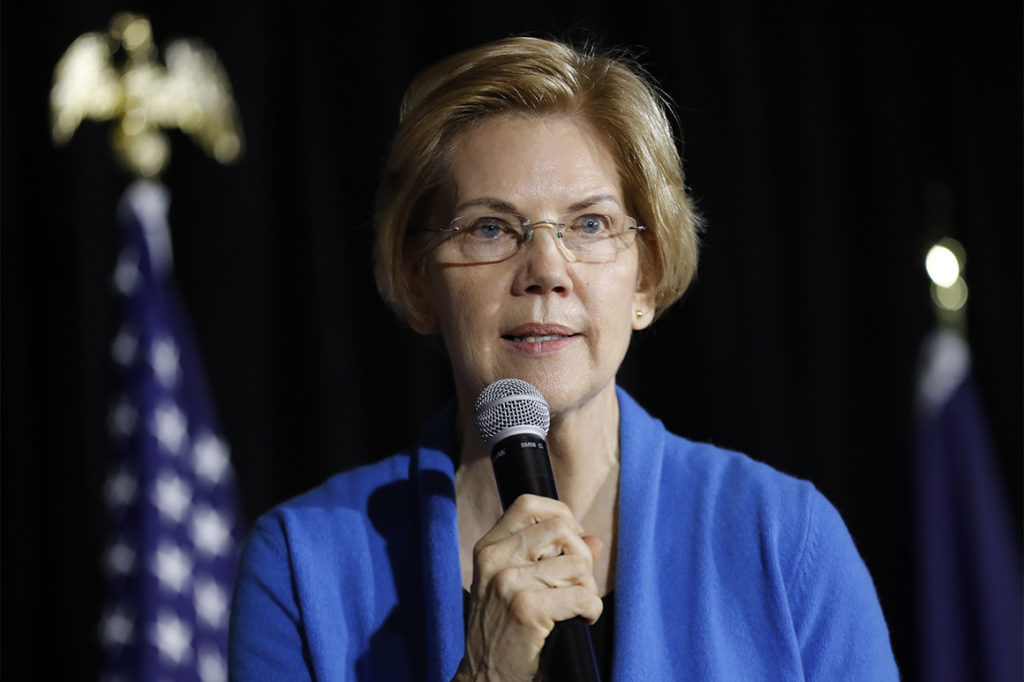On December 31, with much fanfare, Senator Elizabeth Warren announced the launch of “an exploratory committee” for a 2020 run in the Democratic Party presidential primary. But her candidacy became official on Saturday at a rally in Lawrence, Massachusetts, the location of the famous Bread and Roses Strike of 1912, an uprising led by immigrant women. Warren made her declaration part of a speech against the rich, who “have been waging class warfare against hardworking people for decades.”
Trump’s campaign manager tried to paint her as a proponent of “socialist ideas like the Green New Deal.”
This was unsurprising, since Warren’s progressivism has long been lauded as indicating that she’s to the left of the Pelosi wing of the Democrats. She has spoken out against the “Combating BDS Act of 2017” on free speech grounds (although she has repeatedly said she supports Israel), she has voiced support for Medicare-for-All (despite the fact that she introduced a much tamer piece of health care legislation earlier in 2018), and she supports the legalization of marijuana.
At the rally, Warren went on to say: “The man in the White House is not the cause of what is broken, he is just the latest and most extreme symptom of what’s gone wrong in America. A product of a rigged system that props up the rich and powerful and kicks dirt on everyone else. So once he’s gone, we can’t pretend that none of this ever happened.”
She’s right, of course—the problem is much bigger than Trump. However, despite her progressive window dressing, Warren is ultimately not much different from the rest of the Democratic Party. Here are five things to keep in mind:
1. She is firmly in favor of the Israeli occupation.
Although Warren was one of several 2020 candidates to vote against the recent anti-BDS bill, her opposition to such legislation has not been accompanied by any actual criticism of the Israeli state or the IDF. In fact, Warren has long held that the rights of the Palestinian people are secondary to Israel’s “right to exist.” When confronted about a vote to help Israel fund the Iron Dome system, just as the 2014 attacks on Gaza were happening, she replied: “I think the vote was right, and I’ll tell you why I think the vote was right. America has a very special relationship with Israel. Israel lives in a very dangerous part of the world, and a part of the world where there aren’t many liberal democracies and democracies that are controlled by the rule of law. And we very much need an ally in that part of the world….But when Hamas puts its rocket launchers next to hospitals, next to schools, they’re using their civilian population to protect their military assets. And I believe Israel has a right, at that point, to defend itself.” According to Warren’s logic, it’s perfectly acceptable to knowingly take the lives of Palestinian children at school or those getting medical attention, as long as it makes Israel feel safe.
At the same town hall meeting, she rejected a proposal “that Israel should be prevented from building any more settlements as a condition of future U.S. funding,” saying it went “too far,” and campaigned for senator with the promise that, “as a United States Senator, I will work to ensure Israel’s security and success.” She also signed a letter with Republican senators asking Obama to continue to veto any “one-sided UN Security Council resolutions,” citing the need to “provide Israel with greater security and strengthen regional stability,” without a word about protecting Palestine from Israel and its military.
2. She is in favor of increased defense spending and regularly uses the same rhetoric as congressional war hawks when discussing foreign states.
It’s not just Israel—Warren is eager for the U.S. to intervene in military conflicts all over the world. In fact, she consistently uses the same language and arguments as many of the worst war hawks in congress, supporting their fear mongering with statements about virtually every foreign country against which the U.S. has recently threatened military action.
In fact, her history making these statements goes back years. In 2012, she insisted that Iran was a real danger due to its capacity for nuclear weapons—a capacity the rest of the U.S. government had soundly rejected a month earlier, after copious research debunked it. Yet she continued to insist that “Iran is pursuing nuclear weapons” and claimed that “Iran’s pursuit of nuclear weapons is unacceptable because a nuclear Iran would be a threat to the United States, our allies, the region, and the world.” It’s quite clear that Warren was ahead of the curve on stoking further U.S. aggression in the Middle East.
It is with this record that she served on the Armed Services Committee. During the 2017-2018 Congress, Warren helped to draft the National Defense Authorization Act which passed both the Senate and the House and was signed into law in December of 2017. The legislation budgeted $626 billion with $66 billion for various “overseas operations” and was characterized by an increase in the size of the armed forces.
This past June, she shared her “worries” that “a nuclear-armed North Korea is a threat to the security of the United States, our allies, and the world. Generations of North Korean leaders have made and broken promises before—this Administration’s success will be judged on whether it can eliminate Kim’s nuclear weapons and verify they are gone.”
In yet another thinly-veiled hawkish statement, she asserted that, “Both China and Russia invest heavily in their militaries and other tools of national power. Both hope to shape spheres of influence in their own image. Both are working flat out to remake the global order to suit their own priorities. Both are working to undermine the basic human rights we hold dear.”
And that same month she revealed her motivation for U.S. military intervention claiming that “our foreign policy benefited a lot of people around the world.”
3. She’s devoted to capitalism
Warren frequently says one thing and does another. Since 2007 she has built a reputation for confronting Wall Street. But in a foreign policy speech on November 29, she bemoaned the fact that U.S. “economic policies left workers with the short end of the stick: stagnant incomes, decimated unions, lower labor standards, rising costs of living.” However, she made sure to add: “I believe capitalism has the capacity to deliver extraordinary benefits to American workers.”
Warren was a member of the Republican Party from 1991 to 1996, and discussed this in an interview in April of 2014. Instead of repudiating this affiliation, she said, “I was with the GOP for a while because I really thought that it was a party that was principled in its conservative approach to economics and to markets. And I feel like the GOP party just left that.. And they really stood up for the big financial institutions when the big financial institutions are just hammering middle class American families. I just feel like that’s a party that moved way, way away.” This is, of course, ridiculous. Neither of the two major U.S. parties have ever truly moved. But the fact that Warren is proud to say that she embraced the idea of a “conservative approach to economics and markets” and doesn’t seem to feel that ideal conflicts with her current politics makes those politics glaringly clear.
It gets worse. When asked about her statement that she is “capitalist to the bone,” Warren said, “I believe in markets and the benefits they can produce when they work. Markets with rules can produce enormous value. So much of the work I have done—the Consumer Financial Protection Bureau, my hearing-aid bill—are about making markets work for people, not making markets work for a handful of companies that scrape all the value off to themselves. I believe in competition.”
This comes through in her supposedly ‘progressive’ approach to health care. Although she continues to co-sponsor a bill with Bernie Sanders calling for a single-payer health care system, she’s made it clear she would be happier with a health insurance reform bill that allows for health insurance premiums to reach 8.5 percent of a planholder’s income, out-of-pocket prescription costs to reach $250 per month or $500 per family, and Provide more money for ACA outreach and enrollment efforts. Warren and the other Democrats supporting the bill are presenting it as a step towards Medicare for All, but in reality, this is yet another capitalist measure designed to placate those working toward single-payer and to take the wind out of that movement. This is a classic measure used to con people into believing in and accepting a ‘kinder, gentler’ capitalism.
4. She supported Ben Carson
As we reported during the Trump Cabinet confirmation hearings, despite a few “tough questions,” Warren supported—and ultimately voted in favor of—Republican Ben Carson as United States Secretary of Housing and Urban Development. Carson had called the Fair Housing Act “a failed socialist experiment,” and said, “these government engineered attempts to legislate racial equality create consequences that often make matters worse.”
As Warren professes to care about the workers, the appointee she supported won’t even say he supports the concept of a minimum wage.
But this isn’t much of a surprise when we look at the fact that Carson shares Warren’s devotion to capitalism: “I see each individual as human capital that can be developed to become part of the engine that drives our nation ― or, if not developed, becomes part of the load.”
Defending herself against the ire of progressive supporters who couldn’t understand her support, Warren said of Carson, “In his written responses to me, he made good, detailed promises, on everything from protecting anti-homelessness programs to enforcing fair housing laws. Promises that — if they’re honored — would help a lot of working families. Can we count on Dr. Carson to keep those promises? I don’t know. People are right to be skeptical; I am. But a man who makes written promises gives us a toehold on accountability. If President Trump goes to his second choice, I don’t think we will get another HUD nominee who will even make these promises — much less follow through on them.”
So apparently, Warren believes that a Republican who is opposed to the very existence of a minimum wage, who believes in “bootstrap” philosophy, and who maligns public safety nets as actually exacerbating the inequalities of capitalism should at least be partially trusted when he promises protection of those same safety nets. Her assertion of “accountability” is laughable considering the near nonexistence of that quality when it comes to Cabinet members.
5. She remains silent on any progressive issue until it’s over
A CNBC piece pointed out her silence on the Dakota Access Pipeline until the end: “[Warren] was inexplicably MIA during the fight against the Dakota Access Pipeline, saying nothing as thousands of unarmed, peaceful Native Americans and environmental activists were illegally arrested and shot at with tear gas, pepper spray, rubber bullets, freezing water, and grenades by de facto oil police in North Dakota… Warren finally chose to speak out against DAPL on the same day the Army Corps of Engineers denied a crucial permit for the pipeline’s completion.”
And The Observer pointed out: “The Dakota Access Pipeline presented an opportunity for Warren to save face and fight for the rights of Native Americans. The efforts of the Standing Rock Sioux to stop the pipeline have developed into a broader movement for indigenous rights across the country, but again Warren is nowhere to be found in this fight.”
Yet her rhetoric once the fight was over—doubtless after seeing the outpouring of support for the protests—reflected a manufactured passion: “For months, the Standing Rock Sioux and thousands of others have opposed a pipeline that many believe risks contaminating the tribe’s water supply. The Standing Rock Sioux are not animals to be corralled – they are human beings. Good, passionate human beings who have stood together in the middle of a North Dakota blizzard this past week, and stood together for many weeks before, to fight for what they believe in. They should be treated with respect and basic human decency.” Yet this didn’t come up during the violence loosed upon the Sioux and their supporters, including the use of rubber bullets and attack dogs.
And then she made certain to remind the wealthy Democratic Party donors that she was still on their side: “The construction workers and laborers at Standing Rock are also human beings—and they weren’t the ones to decide where to build this pipeline. They are good, hard-working people who are just trying to do their jobs. They also should be treated with respect and basic human decency,” intimating that the construction workers were under threat from the Sioux and the protestors—something that isn’t part of any of the narratives of what happened at Standing Rock.
In the end, Elizabeth Warren is a devout capitalist, which leads her to ignore any progressive movement until it is politically expedient for her to speak up—usually after the fight is over. She will make sure to support even the most draconian Republicans when she feels it’s “necessary,” and will even defend these decisions. And her capitalist imperialism means she fights tirelessly to build the military presence of the United States in the Middle East. In all of this, Warren has shown herself to be a perfect representative of the U.S. ruling class.











